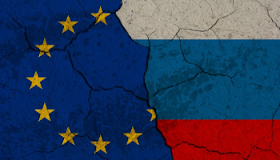Over 427,000 people left Greece since the onset of the economic crisis in 2008, marking the third wave of mass emigration in the 20th and 21st centuries. (Greek Reporter)
The country experiences a wave of mass emigration. The experience of expatriates may be a key to learn best practices from other countries.
Many of the emigrants are young and well educated, resulting in a brain-drain for the Greek society and economy that ultimately is bad news for the country.
A lot of these job opportunity seekers, migrate to other EU member states with stronger economies which offer more opportunity to develop their careers. Yet some of them have found themselves in a peculiar situation. The Greek community in Ireland is growing, despite the difficulties that the Irish economy went through during the past years.
It is estimated that the number of Greeks in the country has doubled - if not tripled, over the period that followed both the Greek and the Irish bail-outs programmes. Partially because Ireland was the first country to exit the EU/IMF monitoring program, there are many other factors that despite all flaws, make the Irish economy more competitive than the Greek.
Apart from the obvious advantages of the English language, its strong ties with the USA and strategic location close to most major European economies, plus of course the much-debated corporate taxation system, Ireland has established a more business-friendly economy.
"In 5 working days, you can set up your business"
Giorgos Stamopoulos is originally from the city of Patra in Greece. He moved to Ireland about 5 years ago, where he started working in various jobs in customer service and the IT industry. But 4 months ago, he decided with his partners to open “Eat-Greek,” a takeaway restaurant in Dublin. Back home, he used to run his own business in the frozen meats trade, but as the economic crisis took over the country, it was hard to make any profit. “People just did not have the money to make any payments,” he describes.
Giorgos Stamopoulos is originally from the city of Patra in Greece. He moved to Ireland about 5 years ago, where he started working in various jobs in customer service and the IT industry. But 4 months ago, he decided with his partners to open “Eat-Greek,” a takeaway restaurant in Dublin. Back home, he used to run his own business in the frozen meats trade, but as the economic crisis took over the country, it was hard to make any profit. “People just did not have the money to make any payments,” he describes.
His new business venture in Ireland is doing very well so far. Overall Giorgos is very impressed and satisfied with the way business is conducted in the country.
“It is very easy to get a license and open a shop in this country, as the license is being issued on the property rather on the individual owner, like in Greece,” he says.
“There is less paperwork or red-tape and dealing with the banks or the local authorities is very much straight-forward,” Giorgos continues.
“Back in Greece opening your own business takes too much time and money, as there are a lot of parties involved; from solicitors to public servants, the owner of the premises, the business partners,” he describes.
In addition, taxation is made easy in Ireland and everything is streamlined to do business faster and with less effort.
The working conditions are better too. There is far more meritocracy in Irish businesses and if you work hard you will succeed, according to Giorgos. Adam Kritidis moved to Dublin around 22 years ago, from his hometown of Edessa. He is also a business owner in Ireland, although for much longer than Giorgos. He opened his first restaurant 16 years ago, and since then he has co-owned to another 8 restaurants in Dublin.
Adam also points out Ireland’s “business-friendly” mentality. “In 5 working days, you can set up your business and additionally, 7 days are required for opening a bank account for it,” he states. That is something that Greece is still lacking behind, hindering naturally much of its business and economic development.
"There is a better work culture"
People that arrived more recently in Ireland, have noticed major differences between the two countries.
People that arrived more recently in Ireland, have noticed major differences between the two countries.
Theodoros Zioutos came to Dublin in 2015, while already being married with two children. He arrived on his own, while his family stayed back in Greece for a while. They were reunited once he settled into his new home. He is a sound engineer, a profession he has been doing since 1995 in Greece. With 20 years of experience, Theodoros decided to resettle in Ireland, as he saw his working rights being scrapped in a country disintegrating under a deep economic crisis.
“I felt that I had no career prospects anymore, while I was seeking to find a financially safer and stable environment to raise my two kids,” he describes.
“In Ireland, working experience is being rewarded and acts as a bonus when seeking employment. There is a better work culture, with staff getting lunch breaks and receiving the necessary rest between shifts,” Theodoros continues.
He adds that health and safety issues are being taken seriously, there is a meritocracy and adequate training is always being given. “Overall there is far more professionalism in an Irish workplace, than in Greece,” he adds.
Theodoros thinks that Greece could follow Ireland’s example in many ways. This includes a better organization and prioritization, less red tape and a more transparent taxation system. In short, streamlining the state’s institutions and their functions.
"I need to work fewer hours to make ends meet"
His quality of life has improved since he moved to Ireland. “I need to work fewer hours to make ends meet, thus I can spend more time with my family, which is important,” he says.
Under the current economic climate, Theodoros does not consider returning to Greece. Yet because of the uncertainty that exists in Europe due to Brexit, he does not exclude moving on to another EU country. There are some things though that some new arrivals from Greece find harder to adopt, although in general, their experiences remain positive.
Matina Velonaki is originally from Athens in Greece. She studied English Literature and prior to her moving to Ireland, she worked as an English teacher. She was also working freelance as a translator but unfortunately, she was not making enough money from either job. Her income in Greece during the crisis was amounting to about 50 € a week.
Matina visited Dublin in 2009 and stayed in the country for one year for studies. After two years back in Greece, she returned to Ireland to find a job. She settled in the city of Cork where she started working in a Greek-speaking, customer service industry related job.
Matina feels that working conditions in Ireland are far better than Greece overall, but she also came across various working conditions, some that she was unfamiliar with, in her home country.
"Bogus Contracts"
“I have never heard of the so-called “bogus contracts” that several multinational companies offer their workers,” she explains.
“Working with no sick leave, demanding working conditions, flexible hours with the minimum wage, plus no worker’s benefits, is something I was not aware that existed in Ireland,” she describes.
During her career, she experienced lack of job security in some multinational companies and in addition, very tough competition among Greeks. She believes that because of the hardships back home, several Greek workers in Ireland have become extra competitive to maintain these jobs.
She plans to remain in Ireland for the long term, but preferably move to Dublin. She got used to the way things work here, although she misses her home country occasionally.
Lessons for Europe
These examples showcase a different work culture that Greece and other EU member states could consider in order to make their economies more competitive.
Not all of them might be applicable to other places in Europe, however examining and debating on them could offer valuable insights on how to reform the way we conduct and attract business, copy the beneficial parts, avoid the mistakes. Thus, expatriate communities could prove to be the best source of experience and knowledge on such issues. I wonder how could their voices be heard, both by their adopted and native countries, to create a constant database of shared apprehension on how to conduct business across Europe.
(Originally written for One Europe by me in 2017)



